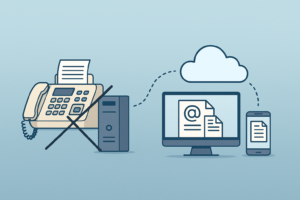Technology is constantly evolving. As we get further from the proverbial hammer and chisel that cavemen used to scrawl stories on rock walls, we continue to find new ways to do things and create new technologies to make life and work easier. Small businesses, especially, benefit from advances in technology that allow them to process transactions more quickly, store documents more securely and innovate more effectively.
Let's take a look at three ways technology is changing the small business environment:
"By 2020, 78 percent of small businesses will be fully cloud-operational."
1. The cloud
"Cloud computing" is a term hot on everyone's tongues of late. For smaller companies especially, utilizing cloud environments for storing important documents and collaborating with project partners is becoming a crucial part of business processes. Technology for small businesses, like the cloud, offers a way for small companies to compete with their bigger counterparts and have capabilities that their budgets wouldn’t normally allow for.
SMBs are migrating toward cloud capabilities. According to Forbes contributor and cloud expert Louis Columbus, a 2015 survey from Intuit found that in the current technology climate, 37 percent of small businesses in the U.S. have made the move to the cloud, but by 2020, 78 percent of them will be fully cloud-operational. In addition, the SMB cloud computing and services market will reflect this shift. By 2016, according to a forecast by Compass Intelligence, this market will be worth $55 billion, enjoying a compound annual growth rate of 40 percent from 2011 to 2016.
2. Mobile tech
In addition to moving capabilities to the cloud, small businesses are relying more on mobile technologies and creating bring-your-own-device policies that are making them more competitive and flexible.
According to Small Business Computing, mobile tech is one of the biggest trends for SMBs in 2015. As more companies come to rely on the enhanced flexibility and mobility that BYOD brings to the workplace, it's increasingly apparent that SMBs and mobile tech go hand-in-hand.
"A growing majority of SMBs regard mobile solutions as essential business enablers with 60 percent saying mobile solutions are critical to business," stated SMB Group in a late 2014 study. "Mobile solutions also account for a growing share of small business technology budgets when we compare findings over the past four years."

3. Fax solutions
Faxing is another technology that has gotten a makeover in the 21st century. Traditional fax machines have been around in some form or another since the 1840s, according to Fax Authority. People have been using this kind of tool to send facsimiles, or copies, of documents and images for over a century. However, it wasn't until the 1980s that the technology really gained steam and started being used ubiquitously in business offices around the world. Now, in the age of cloud computing, cloud-based faxing has become the way to go.
According to Business Insider contributor Thomas Michael, one of the signs that your company is behind the curve when it comes to technology is that you still utilize a physical, traditional fax machine to transmit documents. Fax-over-Internet-protocol systems allow small businesses to send and receive fax documents without investing in bulky office equipment that takes up too much space.
In addition, cloud faxing small business tools and FoIP solutions are inherently safer than traditional systems, because faxes are sent via private virtual servers directly to your email inbox, so that the intended recipient is the only one to see the transmitted document. With traditional fax equipment, managers run the risk that someone would walk past the fax machine at the wrong moment and glimpse confidential information.
Enhance enterprise communication, collaboration and compliance efforts with a proven FoIP solution from FaxCore. Contact FaxCore today to learn more about their 'Partly-Cloudy' fax solutions.



